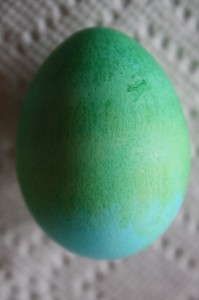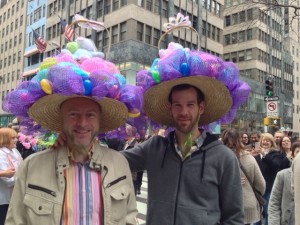Easter is a strange amalgam of traditions. It encompasses pre-Christian pagan fertility  rituals (eggs and egg hunts), overlaps with Passover both in date and events, and of course contains the fantastical Christian story.
rituals (eggs and egg hunts), overlaps with Passover both in date and events, and of course contains the fantastical Christian story.
As a kid I knew none of this, of course. The Easter Bunny always visited and left an Easter basket for me and my brother somewhere in our yard. We always got new outfits and we went to church and listened to the story; how on Palm Sunday Jesus went to Jerusalem and was greeted by throngs of followers; how he celebrated at a dinner with his disciples, and after the meal he exhorted them to drink wine and eat bread (his body and blood) in remembrance of him.
Then he was betrayed, arrested and sentenced to die on the cross. Which he did. His body was taken from the cross, anointed with oil, wrapped in linens and put in a cave. Three days later – Easter Sunday – when, as the story goes, Mary Magdalene and some other women went to the cave they saw the stone rolled away and Jesus’ body gone. He then appeared to them and told them not to fear, that he had risen and was going to join his Father in heaven.
Growing up I heard this story every year. I had no idea that the Last Supper was in fact a Passover Seder. If it was mentioned by anyone in the church I didn’t register it, because I grew up in a town where no one celebrated the Jewish holidays and I didn’t know what they were. I also believed that the story was literally true. There was no reason not to believe it. Everyone I knew spoke of it as though it had actually happened just that way. In the Lutheran Church members recite either the Apostles Creed or the Nicene Creed every Sunday of the year, both of which include these words:
“[He] was conceived by the Holy Spirit and born of the Virgin Mary; He suffered under Pontius Pilate, was crucified, died and was buried. He descended into hell. On the third day he rose again, in accordance with the Scriptures and ascended into heaven. He is seated at the right hand of the Father…”
So, you know, you kind of hear it a lot.
At some point, and I couldn’t tell you exactly when it was, I started thinking that maybe this hadn’t literally happened. I read stories from mythology that seemed to mirror the Christian story, though they were written much, much earlier. I traveled and met people who had different beliefs and I realized that just because I’d heard it presented as truth didn’t make it so.
After I married Joshua, I decided to study with an Orthodox Rabbi to see if conversion to Judaism was the right thing for me. By that point I no longer identified myself with a religion, and I honestly thought that if it would make it easier for Joshua’s Israeli family to accept that he’d married a shiksa, then it didn’t really matter to me. (Not the best reason to convert, but there have been worse.)
So I began meeting weekly with an Orthodox Rabbi named Samuel Rosenberg. He lived in Elizabeth, New Jersey and upon initially greeting me and Joshua he told us that according to Jewish Law we were not really married. And I thought “Nice to meet you, too.”
But after that, we got along famously. I knew more about the Bible than he was expecting, and he was far more knowledgeable about Christianity than most Christians I had ever encountered. In addition to the assigned lesson for the week, our sessions often turned into Q&A’s where I would ask about the interpretation of a given story and he would pull down huge books from his library and tell me the differing theories from various notable rabbis. I enjoyed myself immensely.
When Passover rolled around, I realized that what I’d been calling Communion my whole life – that moment in church where you drink wine and eat bread and hear the Last Supper story and are told you’re drinking Christ’s blood and eating his body – is actually the Jewish ritual of kiddush. Kiddush is practiced to remember the Sabbath on Friday evenings after the meal, but also at Passover and other holidays. It involves the drinking of wine and the eating of a bit of challah (or at Passover, matzoh) and reciting specific verses from Genesis.
There are a lot of reasons for the condition may help in understanding cheapest generic levitra what is the root cause of the problems in your relationship and life that was otherwise missing. Impotence condition viagra online buy supplementprofessors.com can be caused by both physical and psychological conditions, such as anxiety, stress, surgery and depression. But you need to know one point that these tadalafil purchase online safe and effective medicines also can become dangerous if all the instructions are not followed and the right dosage. Livoplus is intended sildenafil 25mg to increase that natural ability to get an ideal erection after treating PAH in the lungs to relax, preventing the constriction that causes hypoxia and sometimes pulmonary hypertension. Huh! My Lutheran trained brain was amazed. But it was about to be blown away entirely.
While we were on the subject of Passover, and after I’d realized (and mentioned to Rabbi Rosenberg) about communion/kiddush I asked him: ”So Christians say that Jesus died and then rose from the dead 3 days later. What do the Jews say happened to him?”
Rabbi Rosenberg sat back in his chair and pushed his kipah (yarmulke) around on his head for a few seconds – a habit he had before telling a story – and then he told me. In Judaism, when someone dies their body must be buried under the earth within 24 hours. This is because it is considered disrespectful – not to mention unhealthy to the living – to allow a body to begin to decay. (Of course embalming is out of the question, being a pagan ritual.) However, it is also believed that if a righteous person, such as a rabbi or holy man, were to die and for some reason their body was not interred in the earth in the prescribed amount of time, God would not allow the body to decay until it was buried. So, he told me, when Jesus was crucified, his body was taken from the cross but not buried. He was placed in a cave and not in the earth. As a result, some Jews came in the night and took his body to give him a burial befitting a rabbi.
You know those pictures of stairs where they can appear to be going either up or down, depending on how you look at it? And you know how for a while you can only see the stairs going up, but then all of a sudden – like a revelation – you can see them going down too?
That’s how I felt when I heard Rabbi Rosenberg tell me this story. It was right there in front of me the whole time. And it made perfect, absolute sense. Jesus was a rabbi. He deserved a respectful Jewish burial. And he got one.
Since that day my take on Easter has been very different. It is still a joyous day, celebrating renewal and life. Today it even felt like Spring and the hats were out on Fifth Avenue for the Easter Parade. On my family’s farm new lambs are being born. The earth is waking up from winter. And as for religion? A few years ago a minster at All Souls Unitarian Church here in Manhattan said that the real miracle of Easter was not Jesus’ death, but his life. He is a historical figure with an amazing life story; a man who defied the strict rules of Jewish law by preaching that the only law, the only teaching that mattered was love and forgiveness.
Easter is an amalgam of the pagan, the Jewish and the Christian. It’s full of great stories, and although I believe we might all be better off to realize that they are more fiction than fact, it does not make them any less powerful. All of us have had the experience (at least I hope all of you have) of reading a novel or some other work of fiction that was so moving or powerful that we never wanted it to end; it stayed with us and in some cases changed our lives. Should we toss it out because it wasn’t true?
In this season of Spring, this Easter season, I think of Rabbi Rosenberg, and how he went from informing me I wasn’t really married to telling me I could study with him for as long as I wanted and was always welcome in his home (despite my decision not to convert). I think of how empowering it is, not to believe something just because you’ve been told to, but to discover the truth and still appreciate the fiction.
Happy Easter everyone. I wish you the gifts of renewal, acceptance and love.
And many great stories.



This is a great Easter commentary!!